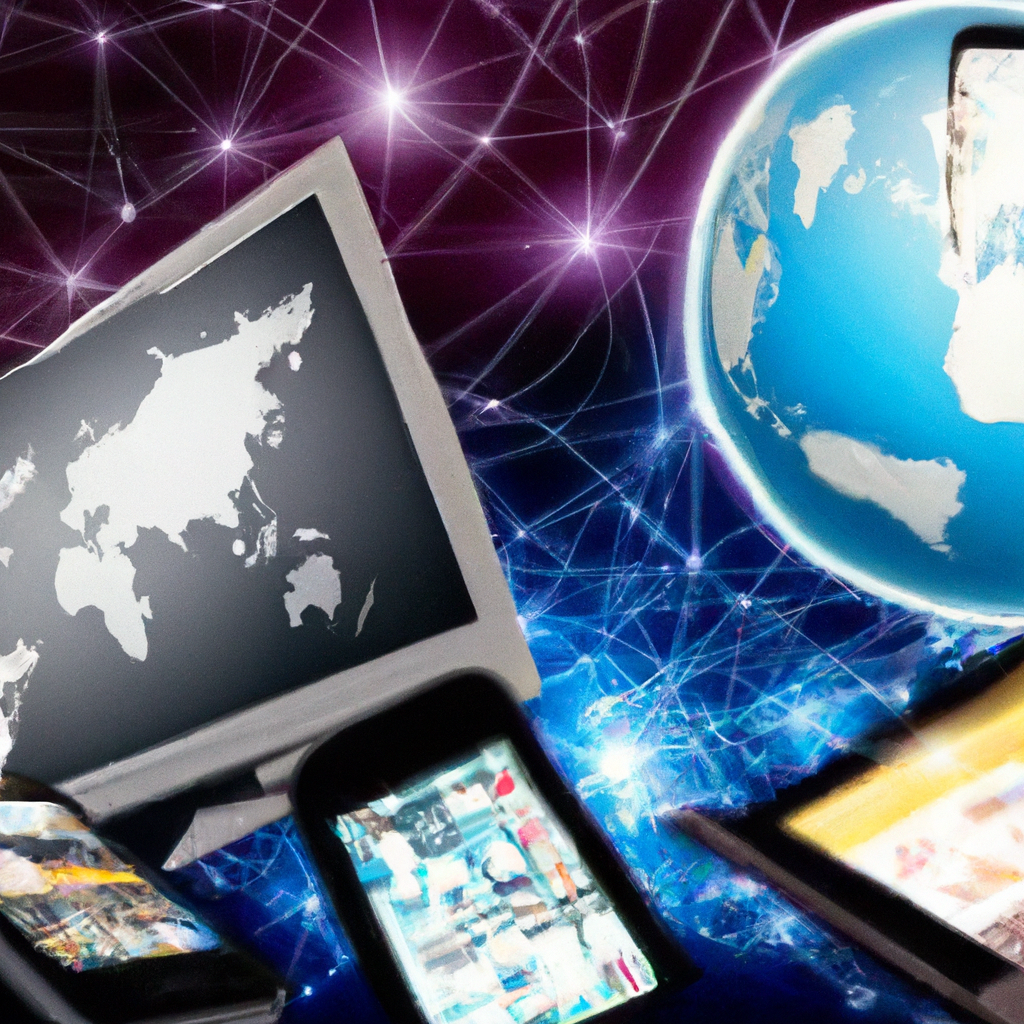In today’s fast-paced world, digitalization has become an integral part of our daily lives. From smartphones to smart homes, technology has completely transformed the way we live, work, and interact with others. With an increasing reliance on digital tools and platforms, one might wonder how exactly this digital revolution improves our quality of life. In this article, we will explore the various ways in which digitalization enhances our everyday experiences, from convenience and efficiency to connectivity and accessibility. So, buckle up and join us on this journey of discovering the incredible impact that digitalization can have on our lives.
Improving Access to Information
Better Access to Education
Digitalization plays a crucial role in improving access to education by providing individuals with a plethora of resources and opportunities to learn. Online platforms and courses make education more accessible to those who may not have the means or ability to attend traditional institutions. With just a few clicks, you can access online courses, tutorials, and educational materials from anywhere in the world. This allows individuals to enhance their knowledge and skills at their own pace, without being constrained by geographical limitations or time schedules. Furthermore, digitalization enables interactive learning experiences, like virtual classrooms and online discussions, which foster collaboration and a deeper understanding of the subject matter.
Enhanced Access to Healthcare Information
Access to accurate and up-to-date healthcare information is vital for individuals to make informed decisions about their well-being. Digitalization has made it easier than ever to access healthcare information through various platforms and applications. Educational websites, online forums, and mobile health applications provide individuals with a wealth of medical information, ranging from self-diagnosis tools to tips for maintaining a healthy lifestyle. Moreover, telemedicine platforms allow individuals to consult with healthcare professionals remotely, eliminating the need for physical visits in non-emergency situations. This not only improves convenience but also ensures access to healthcare expertise for those who may live in remote or underserved areas.
Facilitating Communication and Connectivity
Digitalization has revolutionized the way we communicate and connect with others, breaking down geographical barriers and expanding our social networks. With the advent of social media platforms, instant messaging, and video calling applications, maintaining relationships and staying connected with loved ones has become easier than ever before. Distance is no longer a hindrance to communication, allowing individuals to maintain strong ties with family and friends, regardless of their physical location. Furthermore, digitalization has also facilitated the formation of online communities and support groups, creating a sense of belonging and providing platforms for individuals to seek advice, share experiences, and find like-minded individuals.
Boosting Economic Opportunities
Creating New Jobs and Industries
Digitalization has opened up a world of opportunities, creating new jobs and industries that were unimaginable in the past. From software developers to social media managers, digitalization has given rise to a plethora of new professions. With the increasing reliance on technology and the growth of the digital economy, the demand for skilled workers in the tech sector is higher than ever. Moreover, digital platforms and marketplaces have made it easier for individuals to monetize their skills and talents. Freelancing websites, for example, enable individuals to offer their services globally, reaching a wider client base and increasing their earning potential. The digital age has truly transformed the job market, providing individuals with endless possibilities to explore and pursue their passions.
Expanding Market Access for Small Businesses
Digitalization has levelled the playing field for small businesses by providing them with the tools and platforms to compete with larger corporations. With the rise of e-commerce platforms, small businesses can now reach a global audience, expand their customer base, and compete in the digital marketplace. Digital marketing strategies, such as social media advertising and search engine optimization, enable small businesses to target their desired demographic more effectively and cost-efficiently. Furthermore, online payment systems and secure digital transactions have simplified financial transactions for small businesses, eliminating the need for physical cash or complex payment processes. This ease of access to markets and streamlined operations has enabled small businesses to flourish and thrive in the digital age.

This image is property of pixabay.com.
Improving Efficiency and Convenience
Streamlining Processes and Reducing Waiting Times
Digitalization has significantly improved the efficiency of various processes, reducing waiting times and improving overall productivity. From online booking systems to digital document management, digitalization has streamlined administrative tasks and eliminated the need for manual processes. For instance, booking a doctor’s appointment can now be done with just a few clicks, reducing the need for lengthy phone calls or in-person visits. Similarly, digital document storage and retrieval systems have eliminated the need for physical paperwork, allowing for quick and easy access to important information. These improvements in efficiency not only save time but also enhance the overall convenience and satisfaction of individuals.
Increasing Convenience in Daily Life
Digitalization has revolutionized daily life by introducing a multitude of convenience-enhancing technologies. From smart home devices to mobile applications, digitalization has made various aspects of our lives easier and more convenient. For example, home automation systems allow individuals to control their lights, appliances, and security systems with the touch of a button or a voice command. Mobile applications enable individuals to perform various tasks on the go, such as ordering food, booking transportation, or managing finances. The convenience brought about by digitalization has made our daily routines more efficient and streamlined, giving us more time to focus on the things that truly matter.
Enabling Remote Work and Flexible Lifestyles
Empowering Remote Working
Digitalization has enabled a shift towards remote work, allowing individuals to work from anywhere in the world. The advancements in technology, such as high-speed internet connectivity and collaboration tools, have made it possible for individuals to collaborate effectively with colleagues, regardless of their physical location. This has opened up opportunities for individuals to choose where they work from, whether it’s from the comfort of their home or a coffee shop in a foreign country. Remote work not only provides individuals with greater flexibility but also eliminates the need for long commutes and reduces the associated environmental impact. It allows for a better work-life balance and empowers individuals to optimize their productivity based on their personal preferences.
Facilitating Work-Life Balance
Digitalization has played a significant role in facilitating a better work-life balance for individuals. With the ability to access work-related tools and information remotely, individuals have greater control over their schedules and can allocate time to their personal pursuits and responsibilities. This flexibility allows individuals to spend more quality time with family and friends, engage in hobbies and interests, and take care of their physical and mental well-being. Additionally, digital communication and collaboration tools enable individuals to maintain effective work relationships and stay connected with coworkers, even when they are not physically present in the office. This balance between work and personal life leads to increased job satisfaction and overall well-being.

Enhancing Personalization and Customization
Tailoring Products and Services
Digitalization has enabled businesses to personalize and customize their products and services according to individual preferences and needs. With the vast amount of data collected through digital channels, businesses can gain insights into consumers’ behaviors, preferences, and purchasing habits. This information allows businesses to tailor their offerings to suit the specific needs and desires of their customers, enhancing their overall experience. For example, online retailers can recommend products based on previous purchases or browsing history, making the shopping experience more personalized and efficient. This personalization creates a sense of value and makes individuals feel understood and appreciated by the brands they interact with.
Individualizing User Experiences
Digitalization has allowed for the individualization of user experiences across various industries and platforms. From personalized news feeds to targeted advertisements, digital platforms leverage data and algorithms to deliver content and experiences that are tailored to individual preferences. Social media platforms, for instance, curate content based on users’ interests and interactions, ensuring that individuals are exposed to content that is relevant and engaging to them. Streaming services use algorithms to recommend movies and TV shows based on users’ viewing history, ensuring a personalized entertainment experience. This individualization of user experiences enhances engagement, satisfaction, and overall enjoyment of digital platforms and services.
Promoting Health and Well-being
Empowering Individuals in Managing their Health
Digitalization empowers individuals to take control of their own health by providing them with access to a wealth of health-related information, tools, and resources. From fitness tracking apps to symptom checkers, individuals can monitor and manage their health from the convenience of their smartphones. Health and wellness applications provide individuals with insights into their fitness levels, nutrition, and mental well-being, allowing them to set goals, track progress, and make informed decisions about their health. Wearable devices, such as smartwatches and fitness bands, enable individuals to monitor their vital signs and receive real-time feedback, encouraging healthier lifestyle choices. This empowerment leads to greater autonomy and responsibility for one’s own well-being.
Encouraging Healthy Lifestyles
Digitalization has played a significant role in promoting and encouraging healthy lifestyles among individuals. Mobile applications and online platforms provide individuals with access to fitness classes, workout routines, and healthy recipes, helping them adopt and maintain healthy habits. Moreover, wearable devices and health tracking applications enable individuals to set goals, monitor progress, and receive motivation to stay active and make better choices. Additionally, the online support and accountability provided by various health and wellness communities foster a sense of motivation and encouragement among individuals seeking to improve their well-being. Through digitalization, individuals have the resources and support they need to lead healthier lives.

Improving Safety and Security
Enhanced Surveillance and Emergency Management
Digitalization has enhanced safety and security through improved surveillance and emergency management systems. Surveillance cameras equipped with advanced technologies, such as facial recognition and motion detection, aid in the prevention and detection of crimes. Emergency management systems leverage digital platforms and communication tools to disseminate critical information and coordinate responses during emergencies. Additionally, smartphones and wearable devices can serve as personal safety tools, enabling individuals to call for help or share their location during emergency situations. This enhanced surveillance and emergency management contribute to a safer and more secure environment for individuals.
Securing Digital Identity and Protecting Privacy
As the world becomes increasingly digital, ensuring the security of individuals’ digital identities and protecting their privacy becomes paramount. Digitalization has prompted the development of robust security measures, such as encryption and multi-factor authentication, to protect individuals’ personal information and prevent unauthorized access. Furthermore, data protection regulations, such as the General Data Protection Regulation (GDPR), aim to safeguard individuals’ privacy and ensure that their personal data is handled responsibly by organizations. Digital literacy programs and awareness campaigns also play a vital role in educating individuals about safe online practices and protecting their digital identities. By addressing privacy and security concerns, digitalization creates a safer and more trustworthy online environment for individuals.
Fostering Innovation and Creativity
Supporting Research and Development
Digitalization has revolutionized the research and development process, fostering innovation and creativity across various industries. Digital tools, such as simulation software and data analytics platforms, enable researchers to gather and analyze vast amounts of data, accelerating the discovery and development of new technologies, medicines, and solutions. Collaboration platforms and open-source communities further facilitate knowledge sharing and collaboration among researchers, creating a rich ecosystem for innovation. Moreover, digitalization has democratized access to information and resources, allowing individuals from diverse backgrounds to contribute to research and development efforts. This fostering of innovation drives progress and leads to breakthroughs that improve the quality of life for individuals.
Enabling Access to Creative Tools and Platforms
Digitalization has democratized access to creative tools and platforms, allowing individuals to express their creativity and pursue their artistic passions. From graphic design software to music production platforms, digital tools provide individuals with the means to create and share their work with the world. Online marketplaces and platforms enable artists, musicians, and content creators to showcase and monetize their creations, reaching a global audience and gaining recognition for their talents. Moreover, digital platforms and social media have empowered individuals to engage with and appreciate various forms of art, contributing to the preservation and evolution of cultural expressions. Digitalization has nurtured a vibrant creative community and amplified individual expression.
Simplifying Financial Transactions
Digital Payments and Banking Services
Digitalization has simplified financial transactions by enabling digital payments and providing convenient online banking services. With the rise of mobile payment applications and digital wallets, individuals can make transactions effortlessly without the need for physical cash or cards. These digital payment solutions provide convenience, security, and speed, allowing individuals to make payments with just a tap or a scan. Online banking services further simplify financial management by providing individuals with real-time access to their accounts, allowing for easy transfers, bill payments, and financial planning. The simplification of financial transactions through digitalization improves efficiency and reduces the time and effort required for individuals to manage their finances.
Efficient Transactional Processes
Digitalization has transformed transactional processes by eliminating the need for traditional paperwork and physical presence. Digital contracts and e-signatures enable individuals to sign and execute agreements online, saving time and resources. Online marketplaces and platforms facilitate efficient buying and selling transactions, with digital receipts and records that are easily accessible and manageable. Additionally, blockchain technology has emerged as a secure and transparent method for financial transactions, offering faster and more cost-effective alternatives to traditional banking systems. The efficiency of digital transactional processes not only benefits individuals but also contributes to the overall productivity and growth of the economy.
Challenges and Considerations
Ensuring Digital Inclusion and Accessibility
While digitalization brings numerous benefits, it also creates challenges in terms of ensuring digital inclusion and accessibility for all individuals. The digital divide, characterized by disparities in access to technology and digital literacy, can exacerbate existing inequalities and limit opportunities for certain segments of the population. Efforts must be made to bridge this divide, providing equitable access to technology and digital resources, particularly for marginalized communities and individuals in remote areas. Additionally, promoting digital literacy and skills development programs is crucial to enable individuals to fully participate in the digital world. Ensuring digital inclusion and accessibility is essential for the realization of the full potential of digitalization in improving quality of life.
Addressing Privacy and Security Concerns
As digitalization advances, preserving privacy and ensuring the security of individuals’ digital identities becomes increasingly important. Organizations must prioritize data protection measures, implementing robust security measures and privacy policies to safeguard individuals’ personal information. Governments play a crucial role in developing and enforcing regulations that protect individuals’ privacy rights and hold organizations accountable for handling personal data responsibly. Additionally, individuals must also take personal responsibility for their online presence, practicing safe online habits and being mindful of the information they share. Addressing privacy and security concerns is essential to build trust in the digital ecosystem and ensure that individuals can enjoy the benefits of digitalization without compromising their personal privacy and security.
In conclusion, digitalization has had a transformative impact on various aspects of our lives, improving access to information, boosting economic opportunities, enhancing efficiency and convenience, enabling remote work and flexible lifestyles, enhancing personalization and customization, promoting health and well-being, improving safety and security, fostering innovation and creativity, simplifying financial transactions, and presenting unique challenges and considerations. Through the advancements in technology and the proliferation of digital platforms and applications, individuals have gained unprecedented access to education, healthcare information, communication and connectivity, job opportunities, convenience, personalized experiences, healthier lifestyles, and improved safety. However, it is important to address the challenges of digital inclusion, accessibility, privacy, and security to ensure that the benefits of digitalization are accessible to all individuals while safeguarding their rights and well-being. The ongoing evolution of digitalization holds great potential to continue improving the quality of life for individuals around the world.
